人教版九年级全册 Unit 6 When was it invented?Section A (2d-4c) 课件 (共64张PPT)
文档属性
| 名称 | 人教版九年级全册 Unit 6 When was it invented?Section A (2d-4c) 课件 (共64张PPT) | 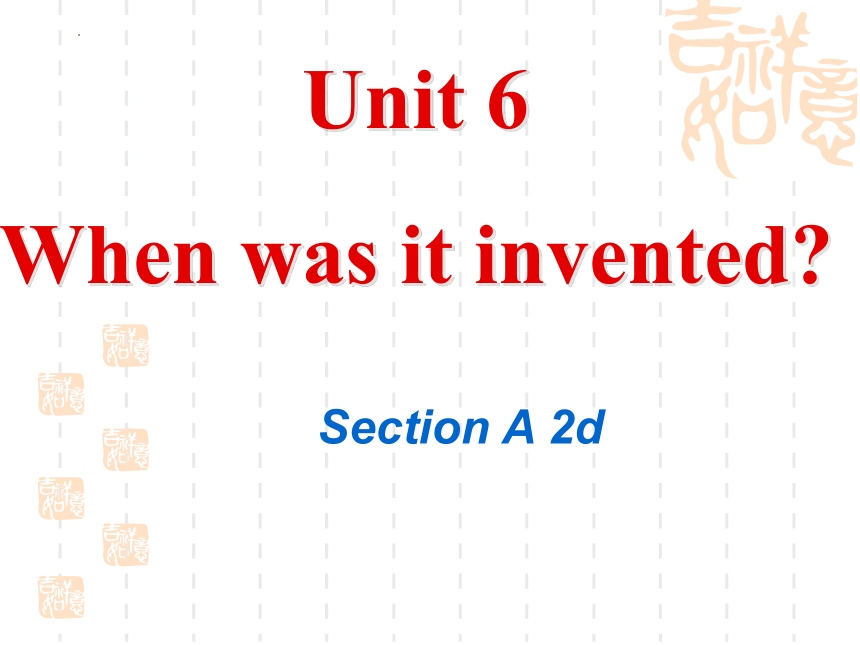 | |
| 格式 | zip | ||
| 文件大小 | 927.8KB | ||
| 资源类型 | 教案 | ||
| 版本资源 | 人教新目标(Go for it)版 | ||
| 科目 | 英语 | ||
| 更新时间 | 2022-10-09 15:19:26 | ||
图片预览

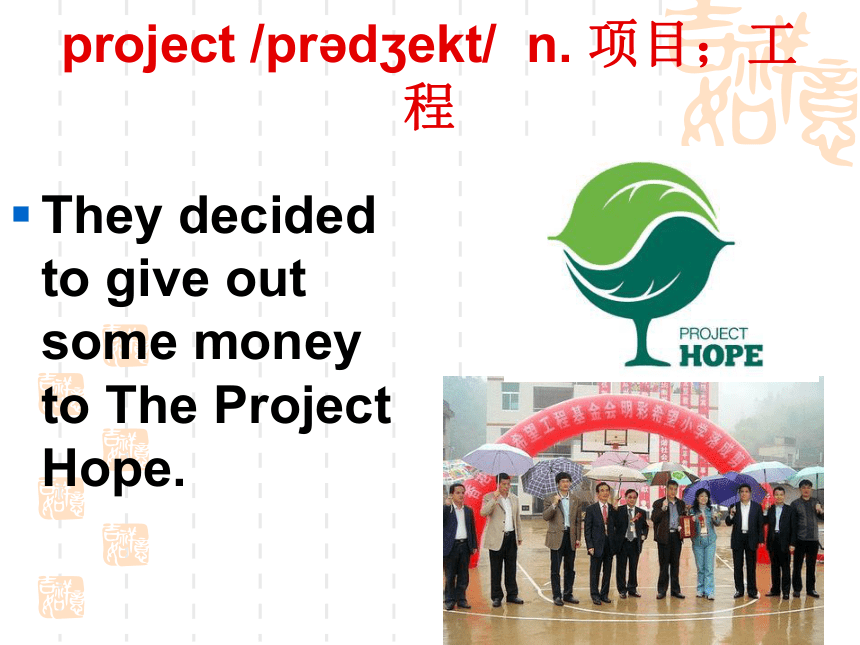

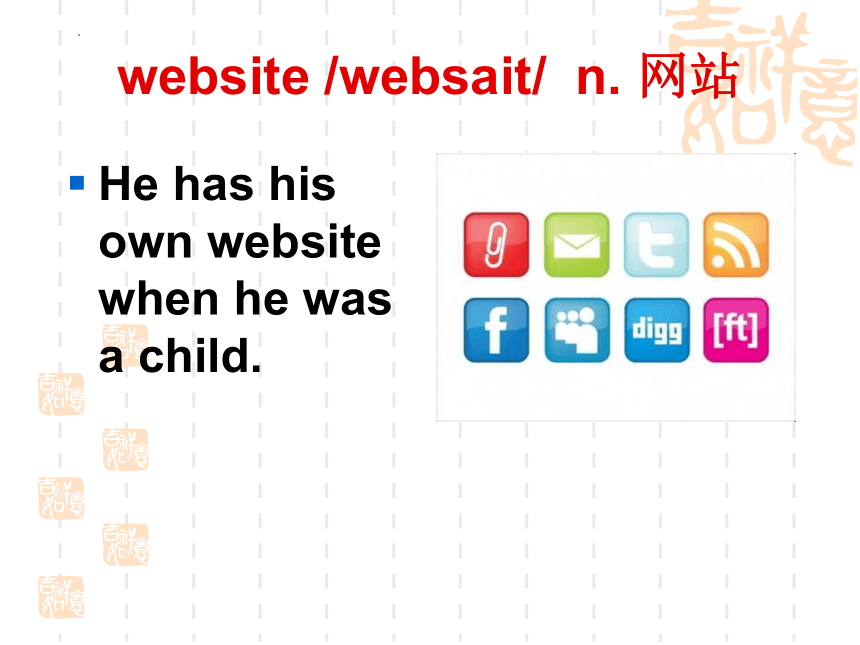
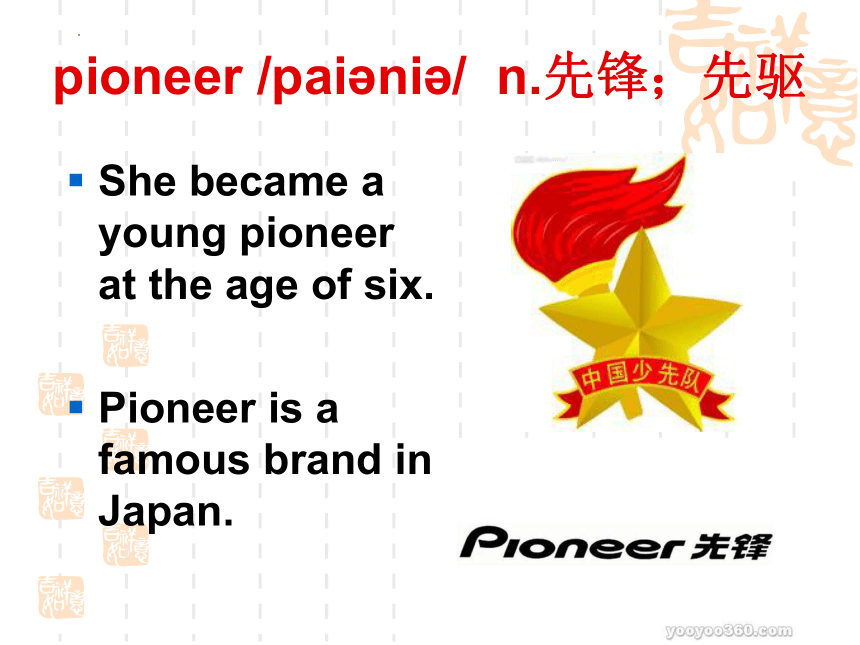
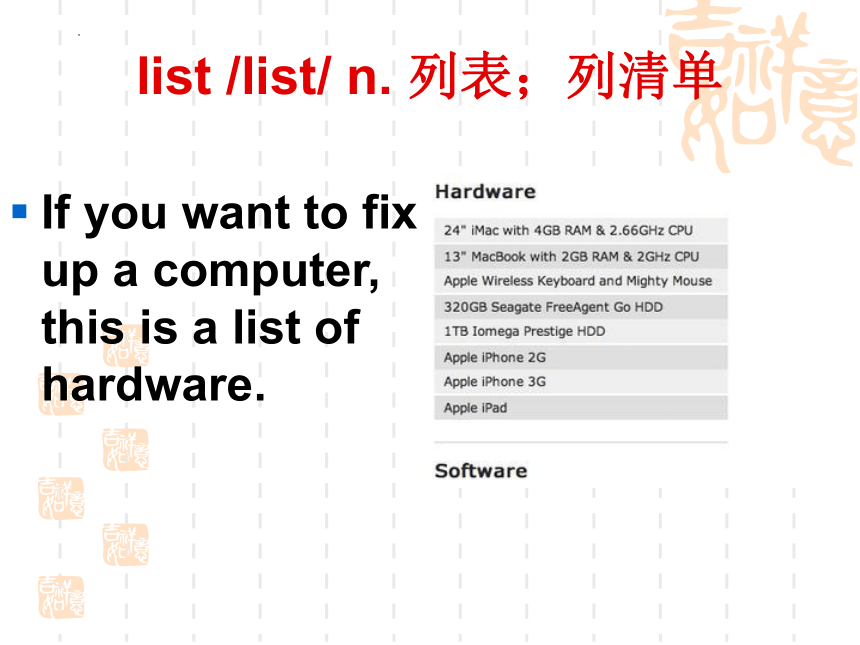
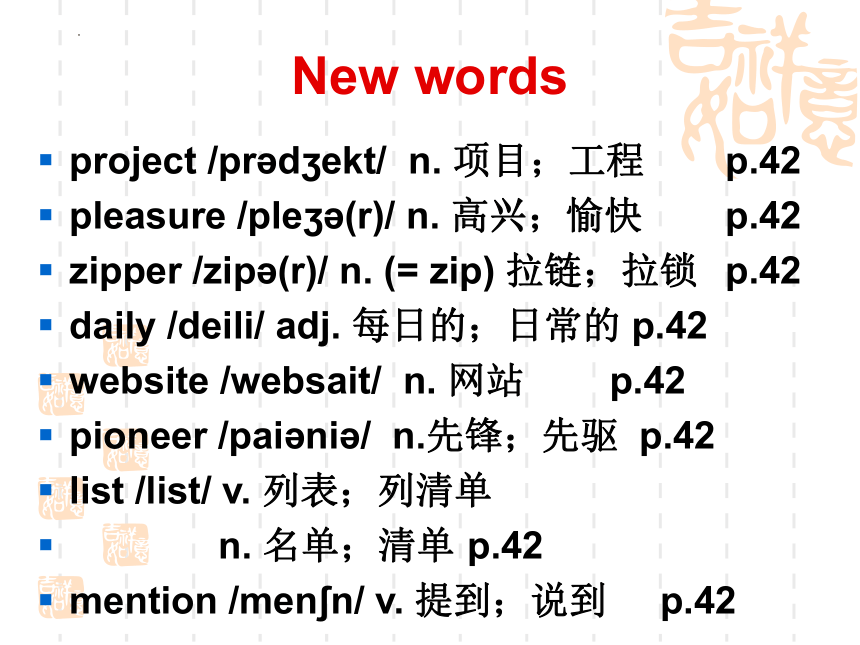
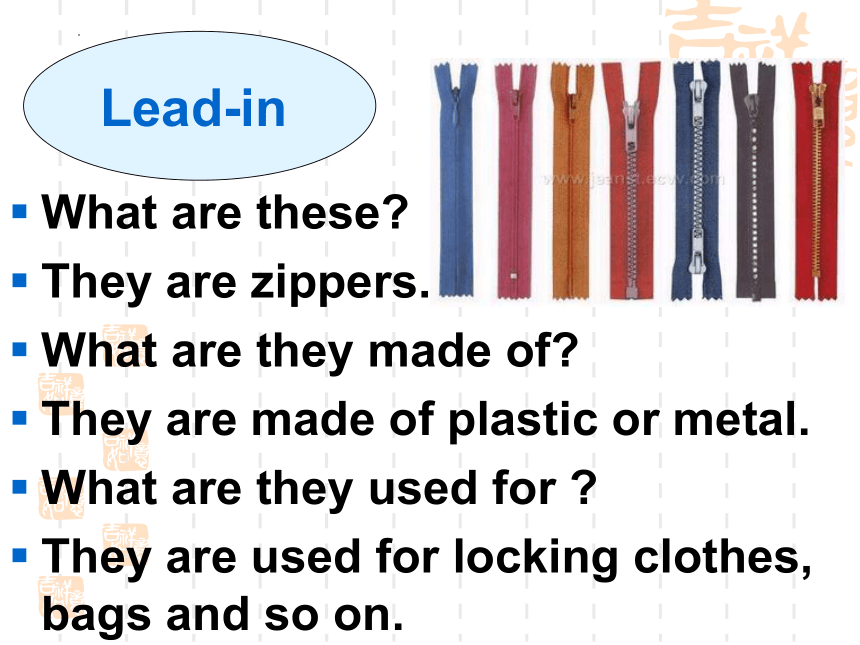
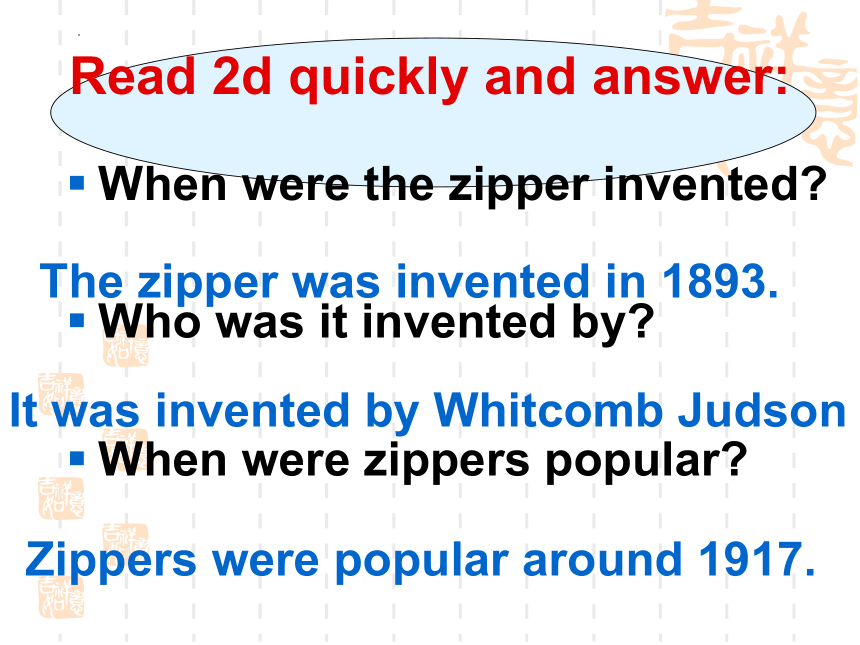
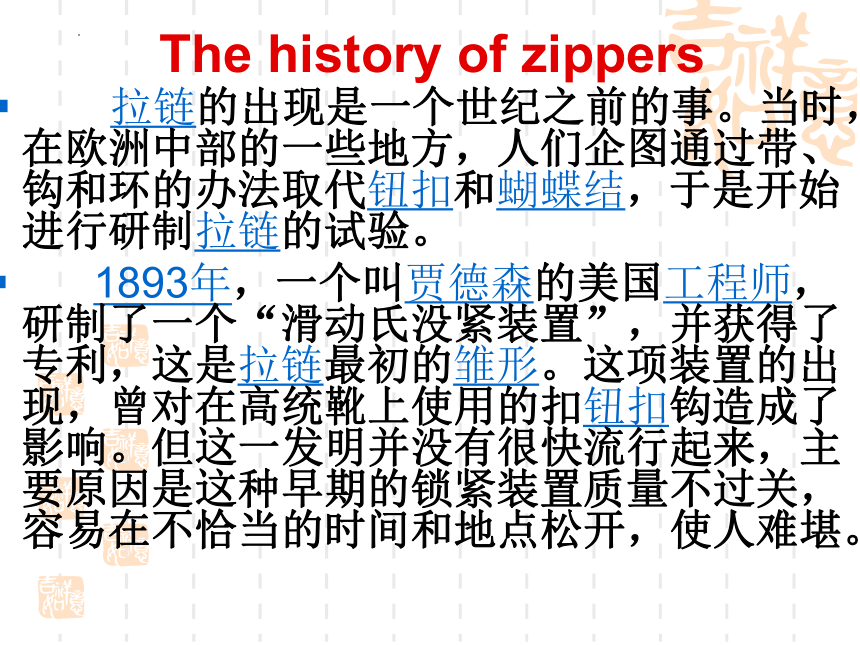
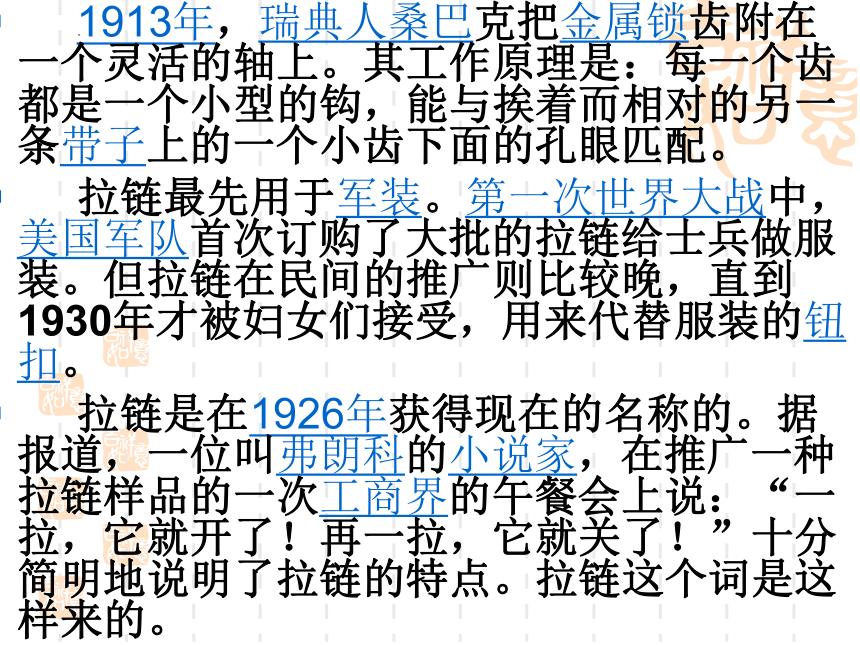
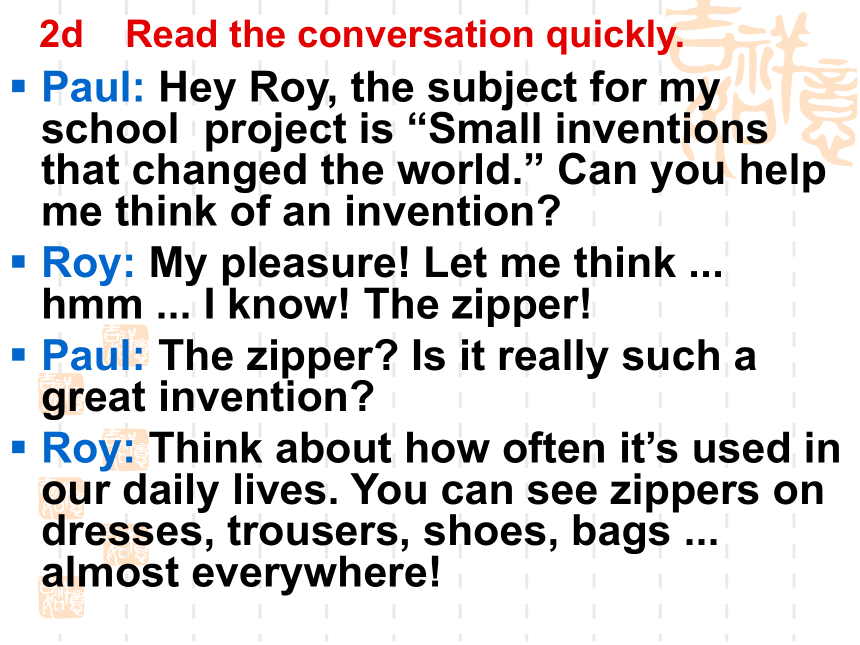
文档简介
(共64张PPT)
Section A 2d
Unit 6
When was it invented
project /pr d ekt/ n. 项目;工程
They decided to give out some money to The Project Hope.
daily /deili/ adj. 每日的;日常的
Everyday she must read some daily newspapers.
You should have a normal daily life.
website /websait/ n. 网站
He has his own website when he was a child.
pioneer /pai ni / n.先锋;先驱
She became a young pioneer at the age of six.
Pioneer is a famous brand in Japan.
list /list/ n. 列表;列清单
If you want to fix up a computer, this is a list of hardware.
New words
project /pr d ekt/ n. 项目;工程 p.42
pleasure /ple (r)/ n. 高兴;愉快 p.42
zipper /zip (r)/ n. (= zip) 拉链;拉锁 p.42
daily /deili/ adj. 每日的;日常的 p.42
website /websait/ n. 网站 p.42
pioneer /pai ni / n.先锋;先驱 p.42
list /list/ v. 列表;列清单
n. 名单;清单 p.42
mention /men n/ v. 提到;说到 p.42
What are these
They are zippers.
What are they made of
They are made of plastic or metal.
What are they used for
They are used for locking clothes, bags and so on.
Lead-in
Read 2d quickly and answer:
When were the zipper invented
Who was it invented by
When were zippers popular
The zipper was invented in 1893.
It was invented by Whitcomb Judson .
Zippers were popular around 1917.
The history of zippers
拉链的出现是一个世纪之前的事。当时,在欧洲中部的一些地方,人们企图通过带、钩和环的办法取代钮扣和蝴蝶结,于是开始进行研制拉链的试验。
1893年,一个叫贾德森的美国工程师,研制了一个“滑动氏没紧装置”,并获得了专利,这是拉链最初的雏形。这项装置的出现,曾对在高统靴上使用的扣钮扣钩造成了影响。但这一发明并没有很快流行起来,主要原因是这种早期的锁紧装置质量不过关,容易在不恰当的时间和地点松开,使人难堪。
1913年,瑞典人桑巴克把金属锁齿附在一个灵活的轴上。其工作原理是:每一个齿都是一个小型的钩,能与挨着而相对的另一条带子上的一个小齿下面的孔眼匹配。
拉链最先用于军装。第一次世界大战中,美国军队首次订购了大批的拉链给士兵做服装。但拉链在民间的推广则比较晚,直到1930年才被妇女们接受,用来代替服装的钮扣。
拉链是在1926年获得现在的名称的。据报道,一位叫弗朗科的小说家,在推广一种拉链样品的一次工商界的午餐会上说:“一拉,它就开了!再一拉,它就关了!”十分简明地说明了拉链的特点。拉链这个词是这样来的。
2d Read the conversation quickly.
Paul: Hey Roy, the subject for my school project is “Small inventions that changed the world.” Can you help me think of an invention
Roy: My pleasure! Let me think ... hmm ... I know! The zipper!
Paul: The zipper Is it really such a great invention
Roy: Think about how often it’s used in our daily lives. You can see zippers on dresses, trousers, shoes, bags ... almost everywhere!
Paul: Well, you do seem to have a point ...
Roy: Of course! I thought about it because I saw a website last week. The
pioneers of different inventions were listed there. For example, it mentioned that the zipper was invented by Whitcomb Judson in 1893. But at that time, it wasn’t used widely.
Paul: Really So when did it become popular Roy: Around 1917.
Summaries
Small inventions that changed the world
think of
My pleasure
Think about
our daily lives我们的日常生活
have a point有点道理
The pioneers of different inventions
at that time
it wasn’t used widely
学生背诵2d对话,不看书填空。
Paul: Hey Roy, the subject for my
school is “Small inventions that changed the world.” Can you help me think of an
Roy: My pleasure! Let me think ... hmm ... I know! The zipper!
Paul: The Is it really such a great invention
Roy: Think about how often it’s used in our lives. You can see zippers on dresses, trousers, shoes, bags ... everywhere!
Paul: Well, you do to have a point ...
invention
zipper
project
daily
seem
Roy: Of course! I thought about it because I saw a last week.
The of different inventions were there. For example,
it that the zipper was invented by Whitcomb Judson in 1893. But at that time, it wasn’t used w .
Paul: Really So when did it become
Roy: Around 1917.
website
pioneers
mentioned
listed
idely
popular
对话内容巩固训练。
Last week, Roy saw a , it says the zipper is one of the small inventions that the world.
It that the zipper was by Whitcomb Judson in 1893. but at that time, it wasn’t widely . Paul thinks he do seems to have a . The zipper is really a great invention and it’s used in our lives very often and .
website
greatest
changed
mentioned
invented
used
point
such
daily
everywhere
Language points
1. subject n.
题目; 问题; 主题;学科, 科目
a subject of conversation
谈话的主题
a serious subject
重大问题
a subject for laughter
笑柄
the main subject in our school
我们学校课程中的主要科目
2. Well, you do seem to have a point…
have a point 有道理
e.g. I admit (that) you have a point.
我承认你有理。
3. Think about how often it’s used in
our daily lives.
think about 表示“考虑,想起”。
e.g. He is thinking about travelling in
the summer holidays.
他正在考虑暑假旅游的事。
She was thinking about her
childhood days.
她正回想她的童年时期。
【拓展有关think的短语】
think of 指“考虑, 记忆, 记起;认为”
e.g. I can’t think of his name at the
moment.
我一时想不起他的名字。
think sth. over指“仔细想, 审慎思考, 作进一步考虑”。
e.g. Please think over what I said.
请仔细考虑我说的话。
I want to think it over.
我想仔细考虑一下这件事。
think sth. out 指“想通, 想出, 熟思”。
e.g. He thought out a new idea.
他想出了一个新主意。
That wants thinking out.
那件事需要仔细考虑。
3. Please,pleasant,pleased,pleasing ,pleasure的用法
please动词,“使高兴;使喜欢;取悦”
如:It’s difficult to please everybody.
要取悦每个人是困难的。
pleasant (物,事)“令人感到愉快的,令人快乐的,(天气)好的”, 如:
We spent a very pleasant evening
我们度过了一个愉快的夜晚。
pleased (人)感到高兴的,喜悦的、满意的。 如:
He is very pleased with the progress
we are making。
他对我们工作的进展很满意。
pleasing 指“令人愉快的”、“合意的”,修饰物体。
如: The food is pleasing to my taste
这饭菜正合我的口味。
pleasure名词,快乐, 愉快, 满意, 高兴;愉快的事情, 娱乐; 乐趣 如:
It is a pleasure for me to live with you
和你一起生活对我来说是件愉快的事情。
May I have the pleasure dancing with you ?
我可以和你跳舞吗
With pleasure.和It's my pleasure.的不同
(1) It’s a pleasure./ It‘s my pleasure与You are welcome.等习语意义相同,用于当别人对你说Thank you. 时,即“不用谢”。例如:
-Thank you for coming to see me .
-It’s a pleasure.
-谢谢你来看我.
-不用谢。
(2) With pleasure与All right, No problem. I’d like to等习语意义相同。用于别人求你做某事,你很乐意去做的时候。非常乐意。例如:
-Could you post the letter for me -With pleasure.
-你能否替我把这封信寄走?
-愿意效劳。
简单讲,It’s a pleasure用于事情发生之后,而with pleasure用于事情发生之前。
(1)根据句意,用pleasant, pleased或pleasure填空。
1.I had a ___ time.
2.He will be ___ to help you.
3.Reading gives me great ___.
4.It gives me ___ to see you looking happy.
5.We spent a ___ day in the country.
pleasant
pleased
pleasure
pleasure
pleasant
Choose the best answer
(2)I think it is impossible to make everyone______.
A. please B. pleased
C. pleasant D. pleasure
B
mention v. 提到,说到;n.提及,说起。
I hope you didn't mention my name to her.
我希望你没有向她提起我的名字,
There was no mention of the matter in your letter.
你的信没有提到过这件事情。
【扩展】
Don't mention it.用来回答感谢或类似于感谢的句子,意为“不用谢;不客气”等;还可用来回答道歉,意为“没关系”。
Thanks for your help.谢谢你的帮助。
Don't mention it.不客气。
用所给词的适当形式补全句子
1.---When the telephone
---I think it in 1876.(invent)
2.---What are the hot ice-cream scoops used for --- They are used for (scoop) really cold ice cream.
3.Many beautiful presents (buy)for the teachers last Sunday.
4.The thief (catch) by the police at last.
5.The new computers (give) to the village school as presents last month.
was
invented
was invented
scooping
were bought
was caught
were given
根据汉语提示完成单词。
1. I like the color of this coat but I don’t like its (款式).
2. It’s my great (高兴) to have a talk with you.
3. The little inventions have helped me a lot in my (日常的)life.
4. Julia introduced a good (网站)to me to learn English.
5. My mother always (列清单)all things that she wants to buy before shopping.
style
pleasure
daily
website
lists
Section A 4a-4c
Unit 6
When was it invented
Review
When was … invented
It was invented in…
What is it used for
It is used for…
最糟糕的发明
“二十世纪最糟糕的发明是什么 ”就是人们每天大量使用的塑料袋。 诞生于上个世纪三十年代的塑料袋,其家族包括用塑料制成的快餐饭盒、包装纸、餐用杯盘、饮料瓶、酸奶杯、雪糕杯等等。这些废弃物形成的垃圾,数量多、体积大、重量轻、不降解,给治理工作带来很多技术难题和社会问题。 比如,散落在田间、路边及草丛中的塑料餐盒,一旦被牲畜吞食,就会危及健康甚至导致死亡。填埋废弃塑料袋、塑料餐盒的土地,不能生长庄稼和树木,造成土地板结,而焚烧处理这些塑料垃圾,则会释放出多种化学有毒气体,其中一种称为二噁英的化合物,毒性极大。
fridge /frid / n. 冰箱
I think a fridge is the most useful invention in modern world.
translate /tr nsleit/ v. 翻译
She is translating the words into
English.
She is a good translator.
lock /l k/, /la:k/
v. 锁上;锁住
He is locking the car.
These locks are strong.
earthquake / :(r)θkweik/
n. 地震
Don’t be afraid of the earthquake.
biscuit /biskit/
n. 饼干
Don’t eat too much biscuit, it isn’t good for your health.
cookie/kuki/
n. 曲奇饼干
Don’t eat so much cookie, because it is too sweet.
instrument /instrum nt/
n. 器械; 仪器;工具;乐器
There are many kinds of instruments in our school.
New words
fridge /frid /
n. 冰箱
translate /tr nsleit/
v. 翻译
lock /l k/, /la:k/
v. 锁上;锁住
earthquake / :(r)θkweik/
n. 地震
sudden /s d n/
adj. 突然(的)
all of a sudden
突然; 猛地
biscuit /biskit/
n. 饼干
cookie/kuki/
n. 曲奇饼干
instrument /instrum nt/
n. 器械; 仪器;工具
When was the zipper invented It was invented in 1893.
Who was it invented by It was invented by Whit comb Judson.
When was tea brought to Korea It was brought to Korea during the 6th and 7th centuries.
What is the hot ice-cream scoop used for It’s used for serving really cold ice-cream.
Grammar Focus
Grammar
The passive voice
被动语态
语态是表示主语与谓语的关系的。如果主语是动作的执行者,动词要用主动语态;反之,如果主语是动作的承受者,动词就要使用被动语态。
被动语态谓语部分结构为助动词be + 过去分词。
一般过去时态的被动形式
注意:这里 be 的形式决定了被动语态的时态,其后的过去分词没有变化。
肯定句
主语 + was\were + 过去分词 + (by …)
否定句
主语+ was\were not +过去分词 +(by …)
一般疑问句
was\were +主语+过去分词 + (by …)
特殊疑问句
疑问词 + was\were +主语 + 过去分词 + (by …)
时态 肯定形式 否定形式 疑问形式
一般 过去时
S +
was/were
+done
S +
was/were
+not + done
Was /Were
+S + done
Maria bought the book last year. (主动句)
The book was bought by Maria last year.
When was the book bought by Maria
What was bought by Maria last year
被动句:
让我们看一看各种句型的主动语态变为被动语态时,到底发生了什么变化?
把下列句子改为被动语态。
1. They made these computers in Shenzhen.
These computers ____ _____ in
Shenzhen.
2. She bought a new bike yesterday.
A new bike ____ ______ by her
yesterday.
were made
was bought
中考真题链接
1. — I feel very happy that I ____ to be the host.
— Congratulations!
A. choose B. am chosen
C. was chosen D. haven chosen
2. Today Chinese ________ by more and more people around the world.
A. was spoken B. is spoken
C. spoke D. speak
3.(课改实验区考生做)
— Your hometown has changed a lot.
— Yes. Take a look at these tall buildings.
They ______ last year.
A. build B.built
C. was built D.were built
(非课改实验区考生做)
— Why is the classroom so dirty
— Sorry, sir. It _______ yesterday.
We forgot to do it.
A. don’t clean B. didn’t clean
C. weren’t cleaned D. wasn’t cleaned
4a Rewrite the sentences using the passive voice.
1. They sold the fridge at a low price.
The fridge was sold at a low price.
2. Somebody stole my camera from my hotel room.
3. Where did you take these photos
My camera was stolen by somebody from my hotel room.
Where were these photos taken by you
4. Our parents advised us not to go out alone.
5. Different writers translated the book into different languages.
We were advised not to go out alone by our parents.
The book was translated into different languages by different writers.
4b Complete the sentences with the correct forms of the verbs in the box.
1. You to the party last night, weren’t you Why didn’t you go
2. The earthquake all
of a sudden, but luckily the villagers to a safe place.
were invited
came
were brought
3. The door when we arrived, so we the bell.
4. The students not to eat or drink in class. But
Ruby the rule
when she started eating a biscuit in science class.
5. The cookies by the hungry kids in less than 20 minutes. Then they for more!
was locked
rang
were told
broke
were eaten
asked
4c Decide whether active or passive forms should be used in these sentences. Write the correct forms in the blanks
The telephone (invent) by Alexander Graham Bell. He (born) in 1847. Alexander (work) on the invention of the telephone with Thomas Watson. In 1875, Alexander (learn) to send musical notes through an instrument similar to a telephone.
was invented
was born
worked
learned \ learnt
Finally, the telephone
(invent) in 1876. The first sentence that (say)
on the telephone by Alexander was “Mr. Watson, come here; I want to see you.” Today the telephone (use) around the world.
was invented
was said
is used
Summaries
1. at a low price 以一个很低的价格
2. take these photos 拍这些照片
3. go out alone 单独外出
4. translate the book into different language
把书翻译成不同种类的语言
5. all of sudden突然
6. work on 从事,进行
用所给词的适当形式填空。
1. This instrument is used for (play) music in class.
2. How many magazines (borrow) from the library today
3. Edison was a great inventor. He had over 1.000 in his life. (invent).
4.A picture (put) on the blackboard before class.
5. Plates and dishes (not wash) after supper yesterday.
playing
were borrowed
inventions
was put
weren’t
washed
根据汉语提示完成单词。
1. The boy lost his parents during the last year’s (地震).
2. The students were asked
to (翻译) the story into English.
3. The police found the lost boy under the destroyed house through an (仪器)。
earthquake
translate
instrument
4. I only have some (饼干) and a glass of milk every morning.
5. If you can’t eat all these fruit , you may put some into your (冰箱).
biscuits
fridge
Section A 2d
Unit 6
When was it invented
project /pr d ekt/ n. 项目;工程
They decided to give out some money to The Project Hope.
daily /deili/ adj. 每日的;日常的
Everyday she must read some daily newspapers.
You should have a normal daily life.
website /websait/ n. 网站
He has his own website when he was a child.
pioneer /pai ni / n.先锋;先驱
She became a young pioneer at the age of six.
Pioneer is a famous brand in Japan.
list /list/ n. 列表;列清单
If you want to fix up a computer, this is a list of hardware.
New words
project /pr d ekt/ n. 项目;工程 p.42
pleasure /ple (r)/ n. 高兴;愉快 p.42
zipper /zip (r)/ n. (= zip) 拉链;拉锁 p.42
daily /deili/ adj. 每日的;日常的 p.42
website /websait/ n. 网站 p.42
pioneer /pai ni / n.先锋;先驱 p.42
list /list/ v. 列表;列清单
n. 名单;清单 p.42
mention /men n/ v. 提到;说到 p.42
What are these
They are zippers.
What are they made of
They are made of plastic or metal.
What are they used for
They are used for locking clothes, bags and so on.
Lead-in
Read 2d quickly and answer:
When were the zipper invented
Who was it invented by
When were zippers popular
The zipper was invented in 1893.
It was invented by Whitcomb Judson .
Zippers were popular around 1917.
The history of zippers
拉链的出现是一个世纪之前的事。当时,在欧洲中部的一些地方,人们企图通过带、钩和环的办法取代钮扣和蝴蝶结,于是开始进行研制拉链的试验。
1893年,一个叫贾德森的美国工程师,研制了一个“滑动氏没紧装置”,并获得了专利,这是拉链最初的雏形。这项装置的出现,曾对在高统靴上使用的扣钮扣钩造成了影响。但这一发明并没有很快流行起来,主要原因是这种早期的锁紧装置质量不过关,容易在不恰当的时间和地点松开,使人难堪。
1913年,瑞典人桑巴克把金属锁齿附在一个灵活的轴上。其工作原理是:每一个齿都是一个小型的钩,能与挨着而相对的另一条带子上的一个小齿下面的孔眼匹配。
拉链最先用于军装。第一次世界大战中,美国军队首次订购了大批的拉链给士兵做服装。但拉链在民间的推广则比较晚,直到1930年才被妇女们接受,用来代替服装的钮扣。
拉链是在1926年获得现在的名称的。据报道,一位叫弗朗科的小说家,在推广一种拉链样品的一次工商界的午餐会上说:“一拉,它就开了!再一拉,它就关了!”十分简明地说明了拉链的特点。拉链这个词是这样来的。
2d Read the conversation quickly.
Paul: Hey Roy, the subject for my school project is “Small inventions that changed the world.” Can you help me think of an invention
Roy: My pleasure! Let me think ... hmm ... I know! The zipper!
Paul: The zipper Is it really such a great invention
Roy: Think about how often it’s used in our daily lives. You can see zippers on dresses, trousers, shoes, bags ... almost everywhere!
Paul: Well, you do seem to have a point ...
Roy: Of course! I thought about it because I saw a website last week. The
pioneers of different inventions were listed there. For example, it mentioned that the zipper was invented by Whitcomb Judson in 1893. But at that time, it wasn’t used widely.
Paul: Really So when did it become popular Roy: Around 1917.
Summaries
Small inventions that changed the world
think of
My pleasure
Think about
our daily lives我们的日常生活
have a point有点道理
The pioneers of different inventions
at that time
it wasn’t used widely
学生背诵2d对话,不看书填空。
Paul: Hey Roy, the subject for my
school is “Small inventions that changed the world.” Can you help me think of an
Roy: My pleasure! Let me think ... hmm ... I know! The zipper!
Paul: The Is it really such a great invention
Roy: Think about how often it’s used in our lives. You can see zippers on dresses, trousers, shoes, bags ... everywhere!
Paul: Well, you do to have a point ...
invention
zipper
project
daily
seem
Roy: Of course! I thought about it because I saw a last week.
The of different inventions were there. For example,
it that the zipper was invented by Whitcomb Judson in 1893. But at that time, it wasn’t used w .
Paul: Really So when did it become
Roy: Around 1917.
website
pioneers
mentioned
listed
idely
popular
对话内容巩固训练。
Last week, Roy saw a , it says the zipper is one of the small inventions that the world.
It that the zipper was by Whitcomb Judson in 1893. but at that time, it wasn’t widely . Paul thinks he do seems to have a . The zipper is really a great invention and it’s used in our lives very often and .
website
greatest
changed
mentioned
invented
used
point
such
daily
everywhere
Language points
1. subject n.
题目; 问题; 主题;学科, 科目
a subject of conversation
谈话的主题
a serious subject
重大问题
a subject for laughter
笑柄
the main subject in our school
我们学校课程中的主要科目
2. Well, you do seem to have a point…
have a point 有道理
e.g. I admit (that) you have a point.
我承认你有理。
3. Think about how often it’s used in
our daily lives.
think about 表示“考虑,想起”。
e.g. He is thinking about travelling in
the summer holidays.
他正在考虑暑假旅游的事。
She was thinking about her
childhood days.
她正回想她的童年时期。
【拓展有关think的短语】
think of 指“考虑, 记忆, 记起;认为”
e.g. I can’t think of his name at the
moment.
我一时想不起他的名字。
think sth. over指“仔细想, 审慎思考, 作进一步考虑”。
e.g. Please think over what I said.
请仔细考虑我说的话。
I want to think it over.
我想仔细考虑一下这件事。
think sth. out 指“想通, 想出, 熟思”。
e.g. He thought out a new idea.
他想出了一个新主意。
That wants thinking out.
那件事需要仔细考虑。
3. Please,pleasant,pleased,pleasing ,pleasure的用法
please动词,“使高兴;使喜欢;取悦”
如:It’s difficult to please everybody.
要取悦每个人是困难的。
pleasant (物,事)“令人感到愉快的,令人快乐的,(天气)好的”, 如:
We spent a very pleasant evening
我们度过了一个愉快的夜晚。
pleased (人)感到高兴的,喜悦的、满意的。 如:
He is very pleased with the progress
we are making。
他对我们工作的进展很满意。
pleasing 指“令人愉快的”、“合意的”,修饰物体。
如: The food is pleasing to my taste
这饭菜正合我的口味。
pleasure名词,快乐, 愉快, 满意, 高兴;愉快的事情, 娱乐; 乐趣 如:
It is a pleasure for me to live with you
和你一起生活对我来说是件愉快的事情。
May I have the pleasure dancing with you ?
我可以和你跳舞吗
With pleasure.和It's my pleasure.的不同
(1) It’s a pleasure./ It‘s my pleasure与You are welcome.等习语意义相同,用于当别人对你说Thank you. 时,即“不用谢”。例如:
-Thank you for coming to see me .
-It’s a pleasure.
-谢谢你来看我.
-不用谢。
(2) With pleasure与All right, No problem. I’d like to等习语意义相同。用于别人求你做某事,你很乐意去做的时候。非常乐意。例如:
-Could you post the letter for me -With pleasure.
-你能否替我把这封信寄走?
-愿意效劳。
简单讲,It’s a pleasure用于事情发生之后,而with pleasure用于事情发生之前。
(1)根据句意,用pleasant, pleased或pleasure填空。
1.I had a ___ time.
2.He will be ___ to help you.
3.Reading gives me great ___.
4.It gives me ___ to see you looking happy.
5.We spent a ___ day in the country.
pleasant
pleased
pleasure
pleasure
pleasant
Choose the best answer
(2)I think it is impossible to make everyone______.
A. please B. pleased
C. pleasant D. pleasure
B
mention v. 提到,说到;n.提及,说起。
I hope you didn't mention my name to her.
我希望你没有向她提起我的名字,
There was no mention of the matter in your letter.
你的信没有提到过这件事情。
【扩展】
Don't mention it.用来回答感谢或类似于感谢的句子,意为“不用谢;不客气”等;还可用来回答道歉,意为“没关系”。
Thanks for your help.谢谢你的帮助。
Don't mention it.不客气。
用所给词的适当形式补全句子
1.---When the telephone
---I think it in 1876.(invent)
2.---What are the hot ice-cream scoops used for --- They are used for (scoop) really cold ice cream.
3.Many beautiful presents (buy)for the teachers last Sunday.
4.The thief (catch) by the police at last.
5.The new computers (give) to the village school as presents last month.
was
invented
was invented
scooping
were bought
was caught
were given
根据汉语提示完成单词。
1. I like the color of this coat but I don’t like its (款式).
2. It’s my great (高兴) to have a talk with you.
3. The little inventions have helped me a lot in my (日常的)life.
4. Julia introduced a good (网站)to me to learn English.
5. My mother always (列清单)all things that she wants to buy before shopping.
style
pleasure
daily
website
lists
Section A 4a-4c
Unit 6
When was it invented
Review
When was … invented
It was invented in…
What is it used for
It is used for…
最糟糕的发明
“二十世纪最糟糕的发明是什么 ”就是人们每天大量使用的塑料袋。 诞生于上个世纪三十年代的塑料袋,其家族包括用塑料制成的快餐饭盒、包装纸、餐用杯盘、饮料瓶、酸奶杯、雪糕杯等等。这些废弃物形成的垃圾,数量多、体积大、重量轻、不降解,给治理工作带来很多技术难题和社会问题。 比如,散落在田间、路边及草丛中的塑料餐盒,一旦被牲畜吞食,就会危及健康甚至导致死亡。填埋废弃塑料袋、塑料餐盒的土地,不能生长庄稼和树木,造成土地板结,而焚烧处理这些塑料垃圾,则会释放出多种化学有毒气体,其中一种称为二噁英的化合物,毒性极大。
fridge /frid / n. 冰箱
I think a fridge is the most useful invention in modern world.
translate /tr nsleit/ v. 翻译
She is translating the words into
English.
She is a good translator.
lock /l k/, /la:k/
v. 锁上;锁住
He is locking the car.
These locks are strong.
earthquake / :(r)θkweik/
n. 地震
Don’t be afraid of the earthquake.
biscuit /biskit/
n. 饼干
Don’t eat too much biscuit, it isn’t good for your health.
cookie/kuki/
n. 曲奇饼干
Don’t eat so much cookie, because it is too sweet.
instrument /instrum nt/
n. 器械; 仪器;工具;乐器
There are many kinds of instruments in our school.
New words
fridge /frid /
n. 冰箱
translate /tr nsleit/
v. 翻译
lock /l k/, /la:k/
v. 锁上;锁住
earthquake / :(r)θkweik/
n. 地震
sudden /s d n/
adj. 突然(的)
all of a sudden
突然; 猛地
biscuit /biskit/
n. 饼干
cookie/kuki/
n. 曲奇饼干
instrument /instrum nt/
n. 器械; 仪器;工具
When was the zipper invented It was invented in 1893.
Who was it invented by It was invented by Whit comb Judson.
When was tea brought to Korea It was brought to Korea during the 6th and 7th centuries.
What is the hot ice-cream scoop used for It’s used for serving really cold ice-cream.
Grammar Focus
Grammar
The passive voice
被动语态
语态是表示主语与谓语的关系的。如果主语是动作的执行者,动词要用主动语态;反之,如果主语是动作的承受者,动词就要使用被动语态。
被动语态谓语部分结构为助动词be + 过去分词。
一般过去时态的被动形式
注意:这里 be 的形式决定了被动语态的时态,其后的过去分词没有变化。
肯定句
主语 + was\were + 过去分词 + (by …)
否定句
主语+ was\were not +过去分词 +(by …)
一般疑问句
was\were +主语+过去分词 + (by …)
特殊疑问句
疑问词 + was\were +主语 + 过去分词 + (by …)
时态 肯定形式 否定形式 疑问形式
一般 过去时
S +
was/were
+done
S +
was/were
+not + done
Was /Were
+S + done
Maria bought the book last year. (主动句)
The book was bought by Maria last year.
When was the book bought by Maria
What was bought by Maria last year
被动句:
让我们看一看各种句型的主动语态变为被动语态时,到底发生了什么变化?
把下列句子改为被动语态。
1. They made these computers in Shenzhen.
These computers ____ _____ in
Shenzhen.
2. She bought a new bike yesterday.
A new bike ____ ______ by her
yesterday.
were made
was bought
中考真题链接
1. — I feel very happy that I ____ to be the host.
— Congratulations!
A. choose B. am chosen
C. was chosen D. haven chosen
2. Today Chinese ________ by more and more people around the world.
A. was spoken B. is spoken
C. spoke D. speak
3.(课改实验区考生做)
— Your hometown has changed a lot.
— Yes. Take a look at these tall buildings.
They ______ last year.
A. build B.built
C. was built D.were built
(非课改实验区考生做)
— Why is the classroom so dirty
— Sorry, sir. It _______ yesterday.
We forgot to do it.
A. don’t clean B. didn’t clean
C. weren’t cleaned D. wasn’t cleaned
4a Rewrite the sentences using the passive voice.
1. They sold the fridge at a low price.
The fridge was sold at a low price.
2. Somebody stole my camera from my hotel room.
3. Where did you take these photos
My camera was stolen by somebody from my hotel room.
Where were these photos taken by you
4. Our parents advised us not to go out alone.
5. Different writers translated the book into different languages.
We were advised not to go out alone by our parents.
The book was translated into different languages by different writers.
4b Complete the sentences with the correct forms of the verbs in the box.
1. You to the party last night, weren’t you Why didn’t you go
2. The earthquake all
of a sudden, but luckily the villagers to a safe place.
were invited
came
were brought
3. The door when we arrived, so we the bell.
4. The students not to eat or drink in class. But
Ruby the rule
when she started eating a biscuit in science class.
5. The cookies by the hungry kids in less than 20 minutes. Then they for more!
was locked
rang
were told
broke
were eaten
asked
4c Decide whether active or passive forms should be used in these sentences. Write the correct forms in the blanks
The telephone (invent) by Alexander Graham Bell. He (born) in 1847. Alexander (work) on the invention of the telephone with Thomas Watson. In 1875, Alexander (learn) to send musical notes through an instrument similar to a telephone.
was invented
was born
worked
learned \ learnt
Finally, the telephone
(invent) in 1876. The first sentence that (say)
on the telephone by Alexander was “Mr. Watson, come here; I want to see you.” Today the telephone (use) around the world.
was invented
was said
is used
Summaries
1. at a low price 以一个很低的价格
2. take these photos 拍这些照片
3. go out alone 单独外出
4. translate the book into different language
把书翻译成不同种类的语言
5. all of sudden突然
6. work on 从事,进行
用所给词的适当形式填空。
1. This instrument is used for (play) music in class.
2. How many magazines (borrow) from the library today
3. Edison was a great inventor. He had over 1.000 in his life. (invent).
4.A picture (put) on the blackboard before class.
5. Plates and dishes (not wash) after supper yesterday.
playing
were borrowed
inventions
was put
weren’t
washed
根据汉语提示完成单词。
1. The boy lost his parents during the last year’s (地震).
2. The students were asked
to (翻译) the story into English.
3. The police found the lost boy under the destroyed house through an (仪器)。
earthquake
translate
instrument
4. I only have some (饼干) and a glass of milk every morning.
5. If you can’t eat all these fruit , you may put some into your (冰箱).
biscuits
fridge
同课章节目录
- Unit 1 How can we become good learners.
- Section A
- Section B
- Unit 2 I think that mooncakes are delicious!
- Section A
- Section B
- Unit 3 Could you please tell me where the restroom
- Section A
- Section B
- Unit 4 I used to be afraid of the dark.
- Section A
- Section B
- Unit 5 What are the shirts made of?
- Section A
- Section B
- Review of Units 1-5
- Unit 6 When was it invented?
- Section A
- Section B
- Unit 7 Teenagers should be allowed to choose their
- Section A
- Section B
- Unit 8 It must belong to Carla.
- Section A
- Section B
- Unit 9 I like music that I can dance to.
- Section A
- Section B
- Unit 10 You're supposed to shake hands.
- Section A
- Section B
- Review of Units 6-10
- Unit 11 Sad movies make me cry.
- Section A
- Section B
- Unit 12 Life is full of the unexpected
- Section A
- Section B
- Unit 13 We're trying to save the earth!
- Section A
- Section B
- Unit 14 I remember meeting all of you in Grade 7.
- Section A
- Section B
- Review of Units 11-14
